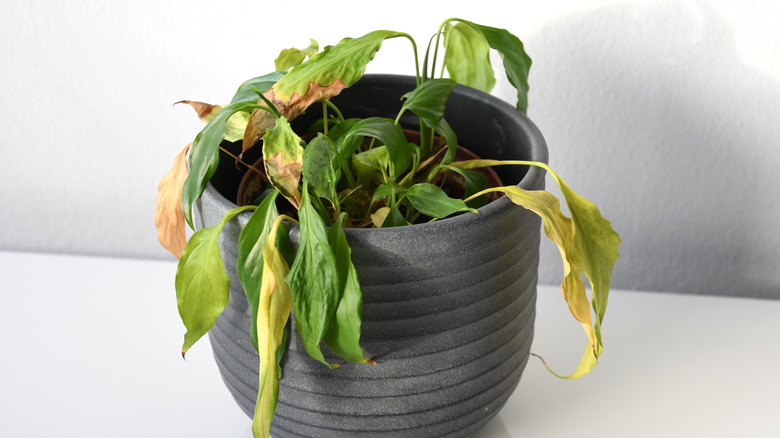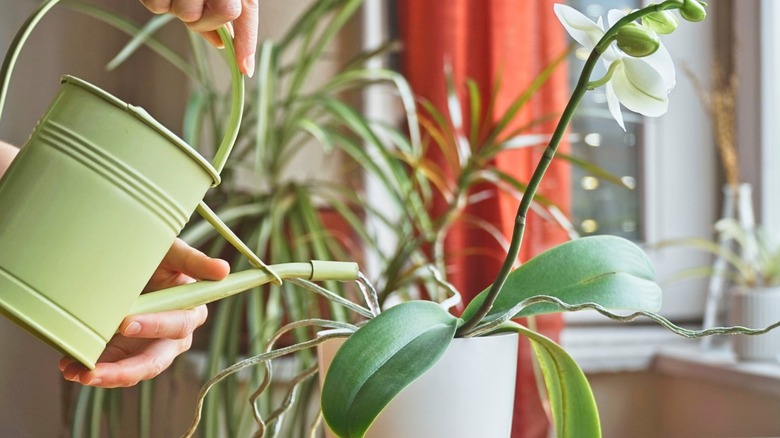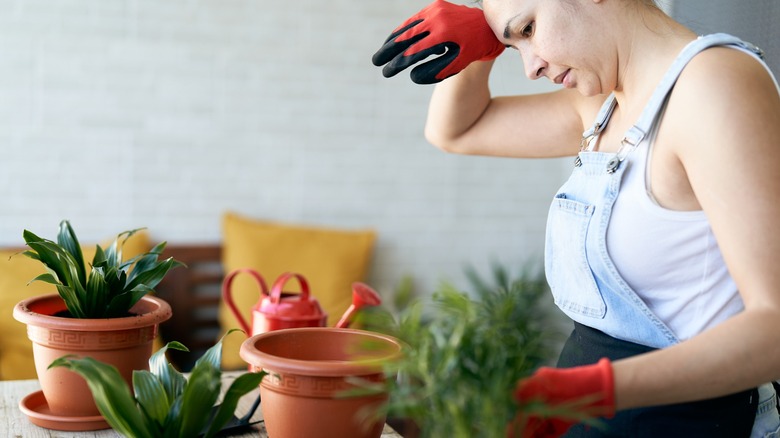Can Coconut Sugar Really Help Revive Wilting Plants? Here's What To Know
The idea of using sugar on plants may seem weird at first, but the logic behind it is actually rooted in the science of how plants interact with their soil environment, particularly through the rhizosphere, the narrow zone of soil around their roots. When plants are stressed, especially from heat or drought, their natural ability to photosynthesize and transport nutrients slows down. Some gardeners believe that by feeding them a small dose of sugar water, you can encourage them to recover faster.
We can confirm that coconut sugar, unlike refined white sugar, contains trace minerals like potassium, phosphorus, and zinc, as well as small amounts of amino acids and inulin, a type of fiber that supports beneficial microbial activity in the soil. Extensive research shows that these microbes play a vital role in stabilizing the soil and encouraging nutrient uptake, especially when a plant's root system is under stress. That said, what works in theory may not always play out the same way in practice.
The reality is that plants don't depend on sugar for energy. They make their own sugar through photosynthesis. What they really need is water, light, and sometimes a little extra support in staying healthy, such as mulching. When they start wilting, your first instinct might be to feed them more nutrients, but fertilizing your garden during a heatwave can be a big mistake. That's why some use coconut sugar instead to give a wilting plant the jolt it needs to recover.
How to use coconut sugar on wilting plants
Before reaching for coconut sugar, make sure your plant is properly hydrated. Wilting is most often caused by underwatering, heat stress, or transplant shock. So, give the plant some water first and wait an hour or two to see if it perks up. If it doesn't, you can go ahead and try this solution.
Don't just pour the sugar onto the plant directly. What you should do instead is mix 1 tablespoon of coconut sugar into about 1 liter of room-temperature water. Stir until it dissolves completely. That way, you get a mild solution that won't overwhelm the soil. Next, use a watering can to pour that mix into the soil around the base of the plant, not on the leaves. The goal here is to gently feed the beneficial microbes in the rhizosphere, not to douse the plant itself in sugar. After applying the solution, you have to wait.
Ideally, you shouldn't use this mix more than once every few weeks, and only when your plants are wilting in the summer heat or showing other signs of stress. That's because too much sugar can throw off your soil's balance and do more harm than good. Ultimately, you can't really control how hot the weather gets. What you can do is support your plant with as much water, shade, and mulch as needed. And when that doesn't seem to be enough, coconut sugar can come in as a supplement.
What happens if you use too much coconut sugar?
A small dose of coconut sugar may help stimulate microbial activity in the soil, but it can easily backfire if you use too much of it. Even though sugar is a good carbon source that can feed good microbes, it can also encourage harmful fungi and bacteria. And since sugar can change the microbial makeup of the soil, it could also reduce how much nitrogen and oxygen are available in the soil.
You might start to notice mold or a sour smell, which is a clear sign that your soil biology is out of whack. So, you have to be careful with coconut sugar. As compelling as it may be to try out every quick hack the internet swears by, you do need to spend some time understanding what your plant actually needs. If your plant is wilting from transplant shock, sunburn, or pest damage, sugar won't fix the root cause. You might have to move your plant to a different location instead, trim off the damaged leaves, or use a pesticide, depending on the situation. This is not to say that gardening hacks don't work. Some of them do. But if you overdo it, you can disrupt the soil's pH level. At the end of the day, most hacks are really just temporary fixes that you should try in moderation and with caution.


